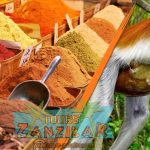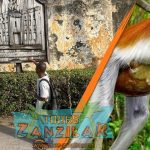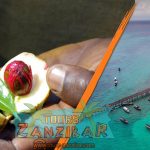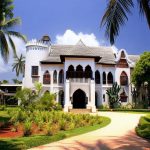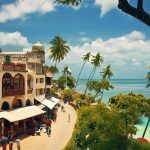Nestled off the coast of East Africa, Zanzibar is a destination famed for its breathtaking beaches and rich history and a burgeoning hotspot for coffee enthusiasts. The island’s unique position in the spice route has infused its local culture with a deep appreciation for flavor and craftsmanship. These qualities are vividly reflected in its burgeoning coffee scene. At Tours-Zanzibar.com, we are delighted to guide you through Zanzibar’s vibrant coffee culture, exploring quaint cafés and distinctive brews that capture the essence of this enchanting island. Join us as we unveil the intricacies of local techniques and traditions that make Zanzibar a must-visit for coffee lovers and cultural adventurers.

Exploring the Roots of Zanzibar’s Coffee Culture
A Journey into Zanzibar’s Rich Coffee Heritage
Amid Zanzibar’s winding alleys and bustling markets, coffee is more than a morning ritual; it’s a cherished cultural heritage brewed into the island’s daily life. Coffee cultivation in Zanzibar began when the Arabs introduced the plant in the 19th century. Since then, it has played a significant role in the archipelago’s social and economic fabric. The local coffee scene offers a unique palette of flavors, each telling its own story of the land and its people.
Local Brews and Beans
Distinct in flavor, Zanzibari coffee is grown in small farms across the island. The volcanic soil and ideal climatic conditions contribute to the beans’ unique quality and taste. Visitors often mention the coffee’s smooth, less acidic flavor than other East African coffees. Zanzibar Peaberry, a local favorite, is celebrated for its rich aroma and full-bodied taste, emanating a sense of the island’s multifaceted nature in each sip.
Exploration of this vibrant coffee culture can lead you to several historic and contemporary cafés, each offering a version of local coffee. Some notable mentions include:
- Babu’s Café: Known for its traditional brewing methods and rustic charm.
- Stone Town Café: Offers a blend of modern and traditional coffee experiences, perfect for those looking to relax after a walking tour.
- The Zanzibar Coffee House offers a deep dive into the complexities of coffee and coffee-tasting sessions led by skilled baristas.
Coffee enthusiasts curious about the cultivation process can visit local plantations to see firsthand the meticulous care and traditional farming techniques employed by Zanzibari farmers. Tours-Zanzibar.com provides guided tours, including visits to these plantations, detailed explanations of the coffee-making process, and opportunities to sample and purchase various local brews.
| Café Name | Specialty | Location |
|---|---|---|
| Babu’s Café | Zanzibar Peaberry | Near Forodhani Market |
| Stone Town Café | Spiced Coffee | Central Stone Town |
| The Zanzibar Coffee House | Assorted Tasting Sessions | Old Fort area |
Whether you are a coffee lover or a curious traveler, Zanzibar’s coffee culture offers a rich tapestry of flavors and traditions waiting to be explored. Join us at Tours-Zanzibar.com to embark on a caffeinated journey through history, taste, and tradition.

The Influence of Local Varieties on Zanzibar’s Coffee Flavors
Exploring the Rich Diversity in Flavor
As you wander through Zanzibar, a striking characteristic of the local coffee culture is how deeply it is influenced by the variety of beans grown in the region. The island’s unique climate and fertile soil produce coffee beans with distinct flavor profiles markedly different from those on the mainland.
Characteristics of Zanzibar Coffee Beans
Zanzibar’s coffee is often noted for its bold, robust flavors – a direct result of the combination of local growing practices and bean varieties such as Bourbon and Typica. Each local café offers a palette of tastes that reflects this inherent diversity:
- **Pungent Earthiness**: Often found in cups brewed in the villages closer to Zanzibar’s hilly terrains, where the beans absorb the rich, volcanic soil.
- **Hints of Spice**: Influenced by the island’s historical trade, hints of cinnamon, nutmeg, and cloves can be detected in many local brews.
- **Subtle Sweetness**: Coastal areas, with their slightly saline air, tend to produce beans with a milder, subtly sweet profile.
Local Brewing Techniques
The method of preparation also plays a crucial role in flavor. Unlike the more automated processes seen globally, Zanzibar retains traditional brewing methods, which add to the coffee’s unique character:
| Method | Impact on Flavor |
|---|---|
| Kahawa Chungu | Produced using a brass pot, it emphasizes richer, darker flavors. |
| Drip Brewing | Encourages a cleaner, crisper taste reflective of the beans’ natural delicacy. |
The deep-rooted traditions and localized variations in cultivating and brewing coffee make each visit to a café in Zanzibar an exploration into the heart of the island’s cultural heritage. When planning your tours through Tours-Zanzibar.com, consider indulging in tasting sessions at various local establishments to experience the spectrum of flavors Zanzibar fully offers.
A Tour of Zanzibar’s Most Cherished Cafés
Exploring Zanzibar’s Unique Café Scene
Imagine sipping on a freshly brewed cup of local Zanzibari coffee, surrounded by the rich aromas and the gentle buzz of friendly chatter. Each café in Zanzibar offers a unique window into the culture and community of this vibrant island. Begin your tour at Café Forodhani, just a stone’s throw from the famous Forodhani Gardens. Coffee enthusiasts can enjoy a robust espresso made from beans sourced directly from local plantations. The café is renowned for its coffee and rooftop seating, which offers panoramic views of the bustling park and the Indian Ocean.
Must-Visit Local Favorites
Next on your café hop is the Stone Town Coffee House. Known for its quaint interior and exquisite Zanzibar coffee blends, this café serves up more than just good brews. Try their signature spiced coffee, a local favorite, which perfectly complements a traditional Zanzibar snack. The staff here are baristas and storytellers, ready to share tales of the island’s rich history and traditions.
Don’t miss out on the Zanzibar Coffee Stop. A favorite among locals, this spot is best known for its excellent service and contribution to sustainable practices on the island. Their commitment to using only biodegradable materials aligns with the ethos of many islanders who are committed to preserving the pristine conditions of their homes. Additionally, the Coffee Stop offers a variety of coffee-making classes, ideal for travelers eager to take a piece of Zanzibar’s coffee culture back home.
Cafés with a Cause
- Mrembo Café: This café serves delicious brews and bites and is part of a larger social enterprise aimed at empowering local women. Enjoy a cup of coffee and some homemade pastries, knowing that your patronage supports important community initiatives.
- Ukuta Art Café: This vibrant café doubles as a gallery for local artists, combining culture with cuisine. The walls are adorned with artwork from up-and-coming Zanzibari artists, all available for purchase. Their espresso, enriched with local spices, offers a unique flavor profile.
Whether a coffee lover or a curious traveler, touring these cafés will give you a deeper appreciation of Zanzibar’s culinary landscape and local traditions. Courtesy of Tours-Zanzibar.com, embarking on this coffee trail promises an immersive experience through the heart of Zanzibar.
Traditional Brewing Techniques in Zanzibar
The Art of Coffee Making in Zanzibar
Zanzibar’s rich history and vibrant culture extend deeply into its coffee-making traditions. Various settlers have influenced the island’s coffee culture over the centuries, but it has cultivated its unique method that takes you back to the roots of traditional brewing. Tours-Zanzibar.com offers a glimpse into these time-honored techniques through guided café tours.
At the heart of Zanzibar coffee making is the Swahili brewing method. This technique involves roasting green coffee beans over an open fire in a large pan. The beans are then ground by hand and brewed using a brass pot called a Kahawa chungu, which translates to ‘bitter coffee.’ It is customary to start with cleansing the palate with a small portion of the brewed coffee, followed by adding several aromatic spices typical to the Zanzibar region, including cardamom, cinnamon, and sometimes nutmeg.
Local Cafés Celebrating Traditional Brews
Visiting local cafés, you’ll likely encounter two traditional presentations of coffee:
- Kahawa tamu: Swahili is for ‘sweet coffee.’ This version is served with ample sugar mixed in.
- Kahawa change: ‘Bitter coffee,’ served with little to no sugar, allowing the full flavor of the spices and robust beans to come through.
Each café has its signature touch to these brews, often handed down through generations. This nurtures a distinctive coffee-drinking experience that reflects the locale’s history, people, and the indigenous flavors of Zanzibar. Understanding these nuances and tasting the differences makes each café visit uniquely enlightening.
| Café Name | Specialty |
|---|---|
| Amani Coffee House | Classic Kahawa change with a dash of coconut milk |
| Zenji Café | Herbal-infused Kahawa tamu |
Through Tours-Zanzibar.com, visitors can immerse themselves in these brewing practices, learn about the deep-rooted coffee traditions, and taste the distinctly rich flavors that Zanzibar has to offer.
Sustainable Coffee Practices on the Spice Island
Embracing Eco-Conscious Coffee Production
In the heart of Zanzibar, coffee farming practices are taking a notable turn towards sustainability. This shift is crucial in preserving the island’s lush landscapes, which nurture Zanzibar coffee’s unique flavors. Local cafés, many of which are partners with Tours-Zanzibar.com, proudly serve brews sourced from plantations that prioritize the environment. These plantations utilize organic farming methods and reduce their carbon footprint by limiting chemical use and managing waste effectively.
Key Sustainable Techniques
- Shade-Grown Coffee: This technique involves growing coffee plants under the canopy of taller trees. This biodiversity conservation practice not only preserves native wildlife habitats but also enhances soil health, reducing the need for artificial fertilizers.
- Water Conservation Measures: Coffee processing can be water-intensive, but Zanzibar’s farms are turning to innovative water recycling systems to minimize waste. By cleansing and reusing water, they reduce the environmental strain on local water resources.
- Composting Coffee Waste: Coffee husks and pulp are converted into organic compost, which returns nutrients to the soil and decreases the reliance on chemical fertilizers.
The result of these eco-friendly practices is a coffee culture that contributes to more sustainable agriculture and produces exceptional flavors celebrated in local cafés across the island. When you sip a cup of Zanzibar coffee, you’re not just tasting rich, aromatic brews but partaking in a legacy of conservation and care.
How to Experience True Zanzibari Coffee Like a Local
Unlocking the Secrets of Local Coffee Preparation
One of the most captivating experiences you can enjoy with Tours-Zanzibar.com is learning how Zanzibar prepares its unique coffee. Locals gather to share stories as the beans roast, filling the air with a rich, aromatic scent, making this a truly communal affair. The key elements of traditional preparation include roasting green coffee beans over an open fire, a practice believed to enhance the flavor with a slight hint of smokiness. This is followed by grinding the roasted beans using a heavy mortar and pestle, producing a fine, powdery consistency crucial for the strong brew Zanzibaris love.
Visit Traditional Coffee Houses
To fully immerse yourself in Zanzibar’s coffee culture, visiting one of the many local coffee houses is a must. These establishments, often tucked away in the narrow alleyways of Stone Town, offer a wide array of Zanzibari-brewed coffees served in traditional clay cups. Here’s what you can expect:
- Coffee with a View: Many coffee houses are in scenic locations where you can enjoy sweeping views of the azure ocean while sipping your brew.
- Sweet Pairings: Local delights like Halwa, a dense and sweet confection made of sugar, nuts, and spices, often accompany a steaming cup of Zanzibari coffee.
- The Coffee Ceremony: Participate in a coffee-making ceremony, a ritual that involves precise brewing techniques and steps and offers deeper insight into the importance of coffee in Zanzibari culture.
| Coffee House | Location | Specialty |
|---|---|---|
| Mambo Coffee Lounge | Stone Town | Spiced Coffee |
| ZanziBeans Café | North Coast | Organic Brews |
| Java Zanzibar | East Shore | Sea View Espresso |
By visiting these spots, you will not only taste great coffee but also connect with local producers and artisans, making your visit a truly enriching experience. So, let Tours-Zanzibar.com guide you through the charming alleys of Stone Town to these historical and flavorful coffee havens.
Recommended Coffee Blends to Try in Zanzibar
Explore Unique Coffee Blends
When you visit Zanzibar, you get to enjoy the rich cultural tapestry and breathtaking landscapes and the opportunity to indulge in unique local coffee blends that are sure to tantalize your taste buds. Through Tours-Zanzibar.com, you can discover several distinctive blends that are a must-try for any coffee enthusiast.
Top Local Coffee Blends
Zanzibar’s coffee scene is vibrantly influenced by its history and geography, leading to many exquisite blends incorporating local flavors and traditions. Among the recommended blends to taste are:
- Spice Island Blend: This robust blend incorporates hints of the famous Zanzibar spices like cloves and cinnamon, offering a thrilling twist to your morning cup.
- Stone Town Espresso: Rich and intense, this espresso blend is crafted to reflect the old-world charm of Zanzibar’s historic Stone Town, perfect for those who enjoy a robust and flavor-packed brew.
- Nungwi Beach Brew: A lighter blend with subtle floral notes, this coffee is inspired by the relaxing and serene beaches of Nungwi. It is ideal for afternoon sipping.
Each blender provides a deep dive into the flavors that make Zanzibar’s coffee culture unique. From the spice-infused to the invigorating espresso, there’s a perfect brew to complement any moment of your day.
Where to Find These Blends
To experience these delightful blends, visit local cafés such as The ZanziBean and Coffee Shaaz. Here, coffees are not only brewed to perfection but are often paired with local treats that enhance the flavor experience. For those looking to taste Zanzibar home, these blends are available in packaged form at various tourist shops around the island.
Through Tours-Zanzibar.com, you can book tours that specifically focus on coffee exploration. These tours provide in-depth insights into the cultivation and production processes and expert-led tasting sessions.
Key Takeaways
In conclusion, exploring Zanzibar’s coffee culture offers a unique lens through which to view the island’s rich heritage and contemporary zest. Whether delving into the intricately prepared cups in Stone Town’s bustling cafés or enjoying a serene brew along the scenic coast, each sip ties back to a long-standing tradition of cultivation and community. As Zanzibar continues cultivating its distinct coffee varieties and café culture, it preserves its historical roots and embraces a thriving, dynamic culinary scene. For the coffee lover or casual tourist alike, Zanzibar’s local cafés and brews present an enriching and flavor-filled journey into the heart of this vibrant island.



